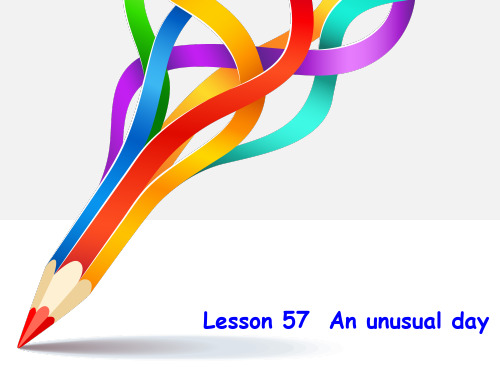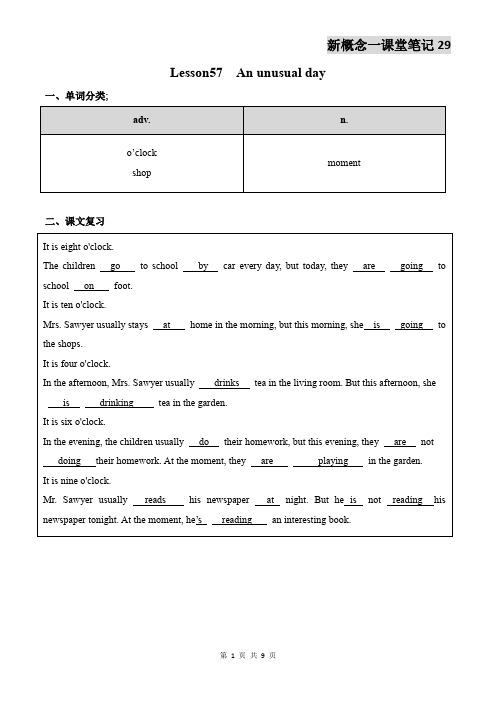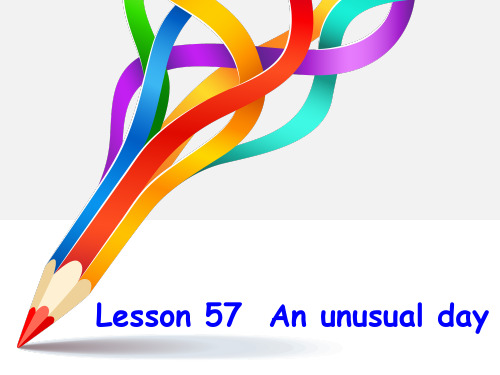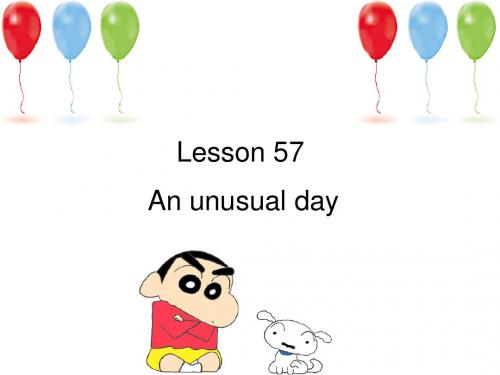新概念英语第一册57课和58课
新概念英语第一册 Lesson57~58-(共19张PPT)

② 逆读 即:先读分钟数,再读钟点数 • 情况一:当分钟数小于30 时,用“分钟数+past+钟点
数”,表示“…点过…分”; 分钟数刚好是半小时时, 可用“half past+钟点数”
如:5:30 half past five 8:10 ten past eight
• 情况二:当分钟数大于30时,用“分钟数(60减去已 知分钟数)+to+钟点数(已知钟点数+1)”,表示 “差…分到…点”。
想想看乘公 交车、火车、 飞机,怎么 说呢?
Grammar
1.钟点的表达法
(1) 整点时间:在钟点数后直接加o’ clock 即可,也可省略。
seven o’clock seven
?
2) 非整点时间: ① 顺读 即:先读钟点数,再读分钟数,数字直接读出
如: 8:30 eight thirty 10:45 ten forty-five
是 后来成 为古希 腊另一 位大哲 学家的 柏拉图 。这个 小故事 所蕴含 的深刻 含意是 显 而 易见的 。
“ 人 贵 有 志 ,人贵有 恒”,这 个道理 是千百 年来人 类在实 践总结 出来的。它深刻地阐 明 :人 最 可 贵 的是有 志向,最 难得 的是持 之以恒 。
你 可 能 羡 慕 那些成 功者吧 !但 你 知 道在他 们成功 的背后 付出了 多少汗 水吗?爱 迪生 说 “ 天 才 是 百分之 一的灵 感,加上 百分之 九十九 的汗水 。”不 要把精 力放在 羡慕别
试一试:
by ship
by plane 特例:步行 on foot
by bus by train
What time is it, Yoyo? It’s half past seven.(7:30)
新概念英语第一册第57-58课课件

1. I goes to school at six every day. go 2. He don’t like playing football. doesn’t 3. They like playing games. likes 4. Daming watchs TV in the evening. watches 5. Does he usually has a party? have do on Sunday? 6. What do they 7. Tony goes always to school at eight o’clock. 8. What do they eat in the party? 9. Lily haves lunch at school. has 10. What do his parents usually gives him ? give
I usually _______ (go) to school by bus. She often _______ (watch) TV. My father _______ (read) magazines at night. He always _____ (eat) lunch at noon. The children _______ (do) homework in the evening. Dennis sometimes ______ ( arrive) home with her sister.
It is ______ o'clock. ________ go to ______ by _______every day, but today, they are going to ________.
新概念英语第一册第57-58课课件

there is a will,there is a way. 有志者,事竟成。
名词的用法
1.名词作主语 The boy opened the door. 2.名词作表语 Class 3 was the winner. 3.名词作宾语 I told him a story.
4.名词作定语 We are discussing the population problem. 5.名词作状语 He sat here a long time. 6.名词作宾语补足语 He named her Jenny.
• ⒉一般现在时常常和always,often,usually,
seldom等频率副词连用;而现在进行时常和 now,at the moment连用。
※动词ing形式的用法及变化规则
• 1)一般情况下直接加ing: think---thinking sleep---sleeping • 2)以不发音字母e结尾的单词,先去掉e,再加ing: wake---waking make---making come---coming • 3)以重读闭音节结尾,呈现“辅,元,辅”结构的动 词,先双写末尾的辅音字母,再加ing 。 这类词有:begin, cut, get, hit, run, set, sit, spit, stop, swim, beg, drop, fit, nod, dig, forget, regret, rid, 等。 • 4)以 y 结尾的动词 直接加 ing: carry—— carrying enjoy—— enjoying • 5)以ie结尾的动词,把ie改为y ,再加ing: die---dying lie---lying
• I'll be back in a moment. 立即,马上 • 我一会儿就回来。 • I'd like to speak to you for a moment. 片刻, 一会儿 我想和你谈一会儿。 • the moment +to do 应该做...的时候
新概念英语第一册57课和58课ppt课件

.
Hale Waihona Puke 17注:时刻表上的时间大多采用24小时表示法,这样就不需 要用a.m.表示上午,p.m.表示下午了。
.
13
12 11
10
1 2
9
3
8
4
7
5
6
What's the time?/ What time is it?
.
14
2. It is ten o'clock. Mrs. Sawyer usually stays at home in the morning, but this morning, she is going to the shops.
Lesson 57 An unusual day
.
1
Review
1. seasons spring、summer、autumn/fall、winter 2. months January、February、March、April、May、June、
July、August、September、October 、November、 December
8:00 childre go to school by car going to school
n
on foot
10:00 Mrs. stays at home Sawyer
going to the shops
4:00 Mrs. drinks tea in the drinking tea in
Sawyer living room
现在是8点钟。 孩子们每天都乘小汽车去上学,而今天,他们正步行去上学。
最新新概念第一册-Lesson-57-58-课堂及课后练习资料

新课内容一、单词:拼读,过关,讲解1、o'clock adv点钟。
整点表示法用o'clcok eg:It's 8 o'clock.现在是8点钟。
2、shop n. 商店(Br.)store n. (Am) eg:She is going to the shops.她正去商店买东西。
短语:go shopping 去购物shopping center购物中心3、moment n 片刻;瞬间短语:in a moment 一会儿;不久;立刻;马上。
at the moment:目前;片刻(现在进行时)at any moment在任何时候;随时. for the moment暂时;目前。
eg: At the moment, they are playing in the garden.此刻,他们正在花园里玩。
二、课文。
1、The children go to school by car every day.孩子们每天都乘小汽车去上学。
2、But today, they are going go school on foot.而今天,他们正步行上学。
every day 每天,为一般现在时的时间状语,用一般现在时。
而“today”与“every day”不同,用现在进行时,(be+doing 的结构)3、Mrs. Sawyer usually stays at home in the morning.索耶夫人通常呆在家里。
Mrs. Sawyer 为第三人称单数,所以动词用stay用单三形式。
4、But this morning, she is going to the shops.但是今天上午,她正去商店买东西。
5、Mr.Sawyer usually reads his newspaper at night.索耶先生通常在晚上看报。
at night在晚上,时间上比evening要晚些。
新概念一册57-58课

现在进行时时间状语/标志词
今天早晨 this morning 今天上午 this afternoon 今天下午 this evening 今天傍晚 tonight 今晚 today 今天 at the moment 现在, 此刻 now
look 看 listen 听
always 总是 usually 通常 often 经常,常常 sometimes 有时
终极PK
语法沉淀
一般现在时
It is eight o’clock. The children go to school by car every day . It is ten o’clock. Mrs. Sawyer usually stays at home in the morning . It is four o’clock. In the afternoon , Mrs. Sawyer usually drinks tea in the living room . It is six o’clock. In the evening , the children usually do their homework , It is nine o’clock. Mr. Sawyer usually reads his newspaper at night .
现在进行时
But today, they are going to school on foot . But this morning , she is going to the shops. But this afternoon, she is drinking tea in the garden. But this evening, they are not doing their homework . At the moment , they are playing in the garden . But he’s not reading his newspaper tonight . At the moment , he’s reading an interesting book .
新概念英语第一册 57-58课

What is Mr.Sawyer doing tonight? It's 8 o'clock ,the children go to school by car every day,but today they're going to school on foot. It is ten o'clock,Mrs.Sawyer usually stays at home in the morning, but this morning she is going to the shops. It is 4 o'clock,in the afternoon,Mrs.Sawyer usually drinks tea in the living room,but this afternoon she is drinking tea in the garden. It is 6 o'clock,in the evening ,the children usually do their homework,but this evening,they're not doing their homework. At the moment, they're playing in the garden. It is 9 o'clock,Mr. Sawyer usually reads his newspaper at night, but he is not reading his newspaper tonight. At the moment, he is reading an interesting book.
58
brush 刷; 梳理
throw 投;抛;掷
新概念英语第一册57课和58课

9:00 Mr.
reads his newspaper reading an
Sawyer
interesting book
1. It is eight o'clock. The children go to school by car every day, but today, they are going to school on foot.
注:时刻表上的时间大多采用24小时表示法,这样就不需 要用a.m.表示上午,p.m.表示下午了。
12 11
10
1 2
9
3
8
4
7
5
6
What's the time?/ What time is it?
2. It is ten o'clock. Mrs. Sawyer usually stays at home in the morning, but this morning, she is going to the shops.
4:00 Mrs. Sawyer
stays at home
drinks tea in living room
going to the shops the drinking tea in the garden
6:00 childre do their homework n
playing in the garden
live + at + ? arrive +at + ?
Review
9. 一般现在时的用法: 当主语是第三人称时,它的构成是:? 主语 + 频率副词 + 三单 + 其他 当主语不是第三人称时,它的构成是:? 主语 + 频率副词 + 动词原形 + 其他 10. 频率副词有哪些?
新概念英语第一册Lesson57-58笔记(语法点+配套练习+答案)

6.The boy reads books every day. (一现)
分钟数大于30分时,用to
1:35twenty-five to two
1:40twenty to two
1:45a quarter to two
1:50ten to two
1:55five to two
对时间提问用:what time
询问时间的特殊疑问句:
1.What time is it?2.What’s the time?
Lesson57 An unusual day
1、单词分类;
adv.
n.
o’clock
shop
moment
二、课文复习
三、课文重点
重点
例句
unusual adj.不寻常的
反义词:usual
构词法:
un- , =not
happy ---unhappy
lucky ---unlucky
adj. + ly =adv.
结构:主+be+动词ing
时间标志词:Look! Listen! now, at the moment, at present, this morning/week
My fatherreads a newspaperevery day.
否:My father doesn’t read a newspaper every day.
回家
stay in bed
呆在床上
by car
坐车
stay with sb.
新概念第一册第57-58课课件

play in the garden
9:00
usually
this morning
read his newspaper
read an interesting book
一般现在时
概念
表示经常性、习惯性、规律性 发生的动作
现在进行时
表示说话时正在发生的动作或状态 (动作未完成)
句子结 构
主语 + 动词原形/单三 +其它
一般现在时
主语
第三人称复数
谓语
动词原形:do
The Sawyers live at 87 King Street. They often drink tea together. The children come home from school. They arrive home early. The children always do their homework.
e.g. Do you stay at home on Saturdays? Does+主语(he/she/it)+动词原形+其他? e.g. Does he stay at home on Saturdays?
特殊疑问句
疑问词+ do/does+主语+动词原形+其他?
e.g. What do you want? What does she want? How do you spell it? How does he spell it? 时间状语/频度副词: every day/often /always/usually/every morning/sometimes
An unusual day
新概念英语第一册57课和58课讲课讲稿

shop[ʃɔp] n. 商店
Shopping 购物 Shopping mall 商场 Window shopping 只逛不买
Go shopping 购物,“血拼”
3 . It is four o'clock. In the afternoon, Mrs. Sawyer usually drinks tea in the living room. But this afternoon, she is drinking tea in the garden.
unusually [ʌn'ju:ʒuəlɪ] adv. 非常;异乎寻常地;显著地 ( un 否定前缀) usually adv.通常
usually
today
8:00 children go to school by car going to school on foot
10:00 Mrs.
stays at home
注:时刻表上的时间大多采用24小时表示法,这样就不需 要用a.m.表示上午,p.m.表示下午了。
12 11
10
1 2
9
3
8
4
7
5
6
What's the time?/ What time is it?
2. It is ten o'clock. Mrs. Sawyer usually stays at home in the morning, but this morning, she is going to the shops.
always(100%)>usually(80%)>often(60%)>sometimes(40% )>seldom(20%)>hardly (10%)>never(0%)
新概念第一册-Lesson-57—58(共34张PPT)

9:00 Mr.Sawyer
read his newspaper
挑战一下吧!
read an interesting book
一般现在时
现在进行时
概念 表示经常性、习惯性、 表示说话时正在发生的动
规律性发生的动作 作或状态(动作未完成)
句子 主语 + 动词原形/单三 主语+be+动词ing+其它
结构
商店
购物中心 shopping center
逛街 购物 go shopping
片刻、瞬间
1> in a moment 一会儿,马上 He will come back in a moment.
2> at the moment 现在,此刻 She is doing her homework ~~~ .
4. What are the children doing at the moment?
They are playing in the garden.
5. What’s Mr. Sawyer doing at the moment?
He’s reading an interesting book.
10:00 Mrs.Sawyer stay at home
4:00
Mrs.Sawyer
drink tea in the living room
变化
go to school on foot
go to the shops
drink tea in the garden
6:00 the children do their homework play in the garden
play (动词)
新概念英语第一册自学导读 Lessons57-58

新概念英语第一册自学导读 Lessons57-58课文详注 Further notes on the text1.by car, 乘汽车。
by(乘坐)表示“乘坐(某种交通工具)”,但它必须与动词连用。
表交通工具的名词前不加冠词:by boat 乘船by bus 乘公共汽车by plane 乘飞机by sea 乘船2.on foot, 步行。
语法 Grammar in use一般现在时与现在实行时一般现在时表示一般的动作或持续重复发生的动作;现在实行时表示说话时正在发生的动作,动作还没有完成。
简单图示如下:一般现在时表示永久的情况;实行时表示暂时的情况。
实行时只用于表示动作或偶尔发生的事件(We are eating, it is raining等等)。
有些动词(如 like, want, know等)不是动作动词,所以不能用实行时态,如不能说 I am knowing或We are liking,而只能说 I know或 We like。
一般现在时表达某个习惯性动作,通常与时间频度副词连用,如usually, always, often, sometimes, never等;现在实行时表示此时此刻正在实行的动作,一般与 now, at the moment, today, this afternoon, this evening, tonight等连用。
We usually watch television at night. But we are listening to the stereo tonight.我们通常晚上看电视。
但是今晚我们正在听立体声节目。
词汇学习 Word study1.play(1)v. 玩,做游戏:The children are playing in the garden.孩子们正在花园里玩耍。
(2)v. 参加(体育活动、比赛等):Let's play chess!咱们来下棋吧!He likes playing basketball.他喜欢打篮球。
- 1、下载文档前请自行甄别文档内容的完整性,平台不提供额外的编辑、内容补充、找答案等附加服务。
- 2、"仅部分预览"的文档,不可在线预览部分如存在完整性等问题,可反馈申请退款(可完整预览的文档不适用该条件!)。
- 3、如文档侵犯您的权益,请联系客服反馈,我们会尽快为您处理(人工客服工作时间:9:00-18:30)。
12 11
10
1 2
9
3
8
4
7
5
6
What's the time?/ What time is it?
2. It is ten o'clock. Mrs. Sawyer usually stays at home in the morning, but this morning, she is going to the shops.
Review
3. 询问来自哪个国家?(两种问法) Where do you come from?=Where are you from?
I come from China. = I am from China.
4. 询问是哪个国家的人? What nationality are you?
现在是4点钟。下午,索耶夫人通常在客厅里喝茶,但今天 下午,她正在花园里喝茶。
9:00 Mr.
reads his newspaper reading an
Sawyer
interesting book
1. It is eight o'clock. The children go to school by car every day, but today, they are going to school on foot.
I’m Chinese.
Review
5. 询问 —你最喜欢哪个季节? Which seasons do your like best?
6. 询问—方位?
在中国的北方 in the north of China 在邯郸的西边 in the west of Handan
Review
quarter (表示一刻钟)qA quarter past one.
在日常生活中,常用下列简单方法表示时间。 以小时、分钟为单位分别读出数字。 6:31 读作 six thirty-one 10:26读作 ten twenty-six 14:03 读作 fourteen o three 16:15 读作 sixteen fifteen 18:30 读作 eighteen thirty 23:55 读作 twenty-three fifty-five
unusually [ʌn'ju:ʒuəlɪ] adv. 非常;异乎寻常地;显著地 ( un 否定前缀) usually adv.通常
usually
today
8:00 childre go to school by car going to school
n
on foot
10:00 Mrs. Sawyer
live + at + ? arrive +aБайду номын сангаас + ?
Review
9. 一般现在时的用法: 当主语是第三人称时,它的构成是:? 主语 + 频率副词 + 三单 + 其他 当主语不是第三人称时,它的构成是:? 主语 + 频率副词 + 动词原形 + 其他 10. 频率副词有哪些?
现在是8点钟。 孩子们每天都乘小汽车去上学,而今天,他们正步行去上学。
by + 交通工具 乘...
o'clock adv. 点钟
1:00
one o’clock
2:00
two o’clock
3:00
Three o’clock
……
时间表达
What's the time?/ What time is it? It's … o'clock. (表示整点) past ( “过了……”,表示半点前) Ten past seven. half (“……半”,表示半点) It's half past eight. to (“差……”,表示半点以后)Ten to seven.
always(100%)>usually(80%)>often(60%)>sometimes(40% )>seldom(20%)>hardly (10%)>never(0%)
text
Lesson 57 An unusual day
unusual [ʌn'juːʒʊəl] adj. 不寻常的;与众不同的;
Lesson 57 An unusual day
Review
1. seasons spring、summer、autumn/fall、winter 2. months January、February、March、April、May、June、
July、August、September、October 、November、 December
4:00 Mrs. Sawyer
stays at home
drinks tea in living room
going to the shops the drinking tea in the garden
6:00 childre do their homework n
playing in the garden
7. 询问 —在早上/在正午/在下午/在晚上/在夜间? in the moring / at noon / in the afternoon/ in the eveing / at night
8. 询问—不及物动词live + arrive?
live + in + ? arrive + in + ?
现在是10点整。上午,索耶夫人通常是呆在家里的,但 今天上午,他正去商店买东西。
shop[ʃɔp] n. 商店
Shopping 购物 Shopping mall 商场 Window shopping 只逛不买
Go shopping 购物,“血拼”
3. It is four o'clock. In the afternoon, Mrs. Sawyer usually drinks tea in the living room. But this afternoon, she is drinking tea in the garden.
